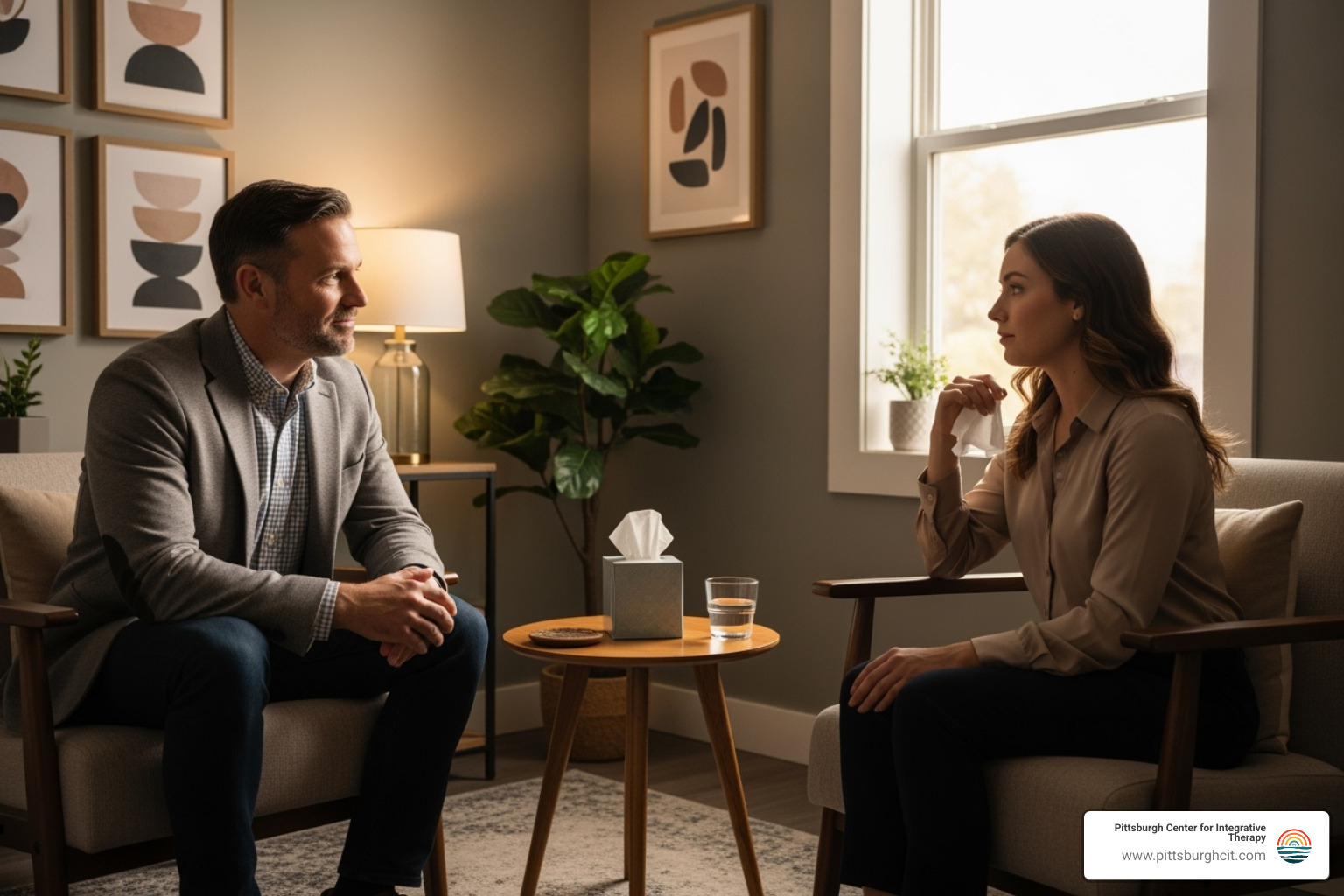Couples Communication Therapy: Why Learning to 'Speak Easy' Can Transform Your Relationship
Why Couples Communication Therapy is the Key to Relationship Change

Couples communication therapy is a specialized form of therapy that helps partners learn to communicate effectively, break negative patterns, and build stronger emotional connections. This evidence-based approach addresses the root causes of relationship conflict and teaches practical skills for healthier interactions, helping couples to:
- Break destructive cycles like criticism and stonewalling
- Learn active listening and validation
- Express needs clearly without blame
- Manage conflict constructively
- Build emotional intimacy and secure attachment
Research shows that couple therapy has an excellent success rate, with studies consistently finding that 70% of couples show improvement. But it’s about how you talk, not just talking more. Many couples get stuck in a “pursue-withdraw” pattern, where one partner pushes for connection while the other pulls away. Without guidance, these cycles often worsen.
The good news is that communication is a learnable skill. At Pittsburgh Center for Integrative Therapy, our licensed therapists specialize in the trauma and attachment issues that often underlie these problems. Through our work with couples communication therapy, we've seen how addressing these deeper patterns creates lasting change.
What is Couples Communication Therapy and How Does It Work?
Couples communication therapy creates a safe space where partners can learn to truly hear each other. At Pittsburgh Center for Integrative Therapy, our licensed group practice therapists understand that communication isn't just about talking more—it's about connecting more deeply.
The primary purpose is to help couples break free from exhausting negative patterns—the same arguments that happen over and over. Our therapists work with you to identify these cycles and build new skills that actually work. Instead of just talking about problems, you practice healthier ways of connecting with your partner under professional guidance. This allows you to try something different in a safe environment.
Research consistently shows that couple therapy has excellent efficacy, with most couples experiencing meaningful positive changes. The success of couples communication therapy comes from the therapeutic alliance you build with your therapist, the hope that change is possible, and the opportunity to engage in a genuine healing process together. You can explore more about the specific skills we focus on in our post about Couples Therapy Communication Skills.
Understanding the "Why": The Role of Attachment and Emotion
To transform how you communicate, it helps to understand why you react the way you do. This is where attachment theory is invaluable. Your earliest relationships created a blueprint for how you connect with others.
If early needs for safety and emotional attunement weren't fully met, you might have developed insecure attachment styles. Anxiously attached individuals may fear abandonment and pursue their partner for reassurance, while avoidantly attached individuals may fear losing independence and pull away. Your communication struggles often aren't about the dishes or the budget; they're about these deeper emotional needs and past experiences.
At Pittsburgh Center for Integrative Therapy, we specialize in helping couples heal these deeper attachment wounds. Creating secure bonds requires vulnerability—sharing your softer emotions and fears. When you understand what triggers big reactions, you can respond from a calmer, more connected place. Our work in Attachment Healing Therapy explores these patterns in greater depth.
What to Expect in Your First Sessions
Starting couples communication therapy at Pittsburgh Center for Integrative Therapy begins with an initial assessment. We invite both partners to share their perspectives on your relationship history, current challenges, and goals for therapy.
This isn't about finding who's right or wrong—it's about understanding the patterns that have developed. Our therapists help you identify your goals, whether it's to argue less or feel more connected. Because every couple is different, we take a personalized approach to your care.
One of the most important parts of these early sessions is building a therapeutic alliance. This foundation of trust and safety is essential, giving you a secure base from which to explore difficult emotions and practice new ways of relating. Think of these first sessions as setting a foundation for trust—not just with your therapist, but with the process itself. You can learn more in our guide to Couples Therapy Consultations.
Unpacking the Root Issues: Common Communication Problems Therapy Can Address

When couples first come to Pittsburgh Center for Integrative Therapy, they often feel trapped in a frustrating loop. The same arguments resurface, or worse, they've stopped arguing, leaving a cold silence between them. These destructive patterns develop slowly, leaving both partners feeling unheard and lonely.
Couples communication therapy specifically targets these stuck places. Our licensed therapists specialize in helping couples identify where and why their communication breaks down. We dig deeper than surface-level disagreements to address the underlying patterns that cause frustration. You can learn more about our approach in our article on Couples Therapy Conflict Resolution.
Dr. John Gottman's research identified four communication styles that can seriously damage a relationship, which he called Gottman's Four Horsemen. These are Criticism (attacking character), Contempt (conveying disgust), Defensiveness (playing the victim), and Stonewalling (shutting down). Recognizing these patterns is the first step toward changing them.
The Pursue-Withdraw Pattern
Perhaps the most common cycle we see in couples communication therapy is the pursue-withdraw pattern. This anxious-avoidant dynamic is a painful dance where one partner reaches for connection while the other pulls away.
One partner, feeling disconnected, tries to bridge the gap. The other, feeling overwhelmed, responds by shutting down. The first partner, now feeling abandoned, pursues harder, while the second withdraws further. It's a cycle where one partner pushes while the other pulls away, and both end up getting what they fear most. The pursuer's fear of abandonment is triggered, while the withdrawer's fear of engulfment is activated.
Breaking the cycle requires understanding what's happening underneath. The pursuer is reaching for connection, and the withdrawer needs space to regulate. Our approach, particularly through EFT Couples Therapy, helps couples understand the dance and learn new steps that bring them closer.
When Stress Overwhelms Communication
Life's curveballs—financial pressure, work stress, and family issues—can put tremendous strain on a relationship. When we're stressed, our brains go into survival mode, making empathy and patience much harder.
We often see couples where partners handle stress differently. Some internalize stress and need quiet space, while others externalize stress and need to talk things through. When these styles collide, it can create tension. The internalizer's silence might feel like rejection to their partner, while the externalizer's need to talk might feel overwhelming.
How stress impacts listening is profound; we're more likely to interpret neutral statements as attacks. Couples communication therapy helps you recognize these different stress responses and learn to turn towards each other even when life feels chaotic. Sometimes one partner is dealing with personal challenges that affect the relationship, which is why we also offer specialized support like Couples Therapy for Depression.
Proven Techniques Used in Couples Communication Therapy Sessions
At Pittsburgh Center for Integrative Therapy, our couples communication therapy is built on evidence-based approaches like Emotionally Focused Therapy (EFT), Internal Family Systems (IFS), and somatic approaches. Research shows these frameworks create lasting change.
Think of these as different lenses for understanding your relationship. EFT helps shift negative emotional cycles, IFS helps you understand the different "parts" of yourself in conflict, and our somatic approaches tune into how your body holds stress, helping you respond thoughtfully rather than reactively.
We don't just talk about change—we help you experience it in the therapy room. Our therapists act as process consultants, guiding you through real-time exercises to practice new ways of connecting. It’s like having a coach for communicating with love and understanding. You can learn more about our approach to Emotionally Focused Therapy (EFT) and how it creates new emotional experiences.
Identifying and De-escalating Negative Cycles
One of the most powerful parts of couples communication therapy is learning to see your conflict patterns from a bird's-eye view. We call this "mapping the cycle," and it helps you realize that what feels like random fights actually follows predictable patterns. This process is freeing because it shows that neither of you is the "bad guy"—you're just stuck in a dance that isn't working.
Once we identify your cycle, we can recognize the early warning signs. De-escalation becomes possible when you can catch these moments early. Instead of getting swept away by emotion, you learn to pause and choose a different response. This often means accessing the softer emotions hiding under anger or defensiveness. Instead of shouting, you might learn to say, "I'm feeling really scared that I don't matter to you right now." This shift from secondary emotions (anger) to primary emotions (fear, sadness) can change the entire conversation.
Learning to regulate these intense emotions is a key goal, which we explore in our article on Using Emotionally Focused Therapy Techniques for Emotion Regulation in Couples.
Creating New, Positive Interactions (Enactments)
Here's where the real magic happens in couples communication therapy. Once we slow down negative cycles, we create "enactments"—new, positive ways of interacting that build connection. These are opportunities to practice expressing your deepest needs and vulnerabilities in a safe environment.
During these enactments, you might share things you've never felt safe enough to express before, like a fear of abandonment or a feeling of loneliness. When your partner responds with empathy instead of defensiveness, it creates a "corrective emotional experience." These moments literally rewire your brain's expectations about relationships, helping you build more secure attachment patterns.
The goal is to learn to turn to your partner for comfort rather than turning away. These new interactions become the building blocks of a stronger, more resilient relationship, creating what we explore in our article on the Pathway to Deeper Connection for Couples. Each positive interaction builds on the last, helping you trust that your relationship can be a safe harbor.
Practical Communication Exercises for You and Your Partner

The real change in couples communication therapy happens when you take what you've learned in our sessions at Pittsburgh Center for Integrative Therapy and apply it to your daily life. Therapy is your practice space, but home is where the magic unfolds.
We often give couples "homework" because building new communication habits requires consistent practice. These aren't tedious assignments but opportunities to strengthen your bond. Simple habits like a daily check-in, expressing gratitude, offering physical touch, or giving positive affirmations create a foundation of goodwill that makes harder conversations much easier.
Active and Reflective Listening
Most of us think we're good listeners, but we're actually just waiting for our turn to talk. True listening is about fully receiving your partner's experience without jumping to solutions or defenses.
The speaker-listener technique is a powerful tool we teach in couples communication therapy. The speaker shares using "I" statements, while the listener's only job is to understand. Reflective listening means paraphrasing what you heard ("What I hear you saying is...") to ensure you got it right. The goal isn't agreement, but validation—acknowledging that their feelings make sense from their perspective. A simple phrase like "Tell me more" shows genuine curiosity and invites your partner to go deeper.
Using "I" Statements to Express Needs
This technique is transformative because it shifts conversations from blame to understanding. Instead of saying "You always interrupt me!" you learn to express your experience from your own perspective.
The formula is: "I feel [emotion] when [specific behavior] happens, and I need [specific action]." For example: "I feel unheard when I'm sharing and you're looking at your phone, and I need you to make eye contact."
This approach takes ownership of your feelings while reducing blame, making it easier for your partner to respond with empathy. Research on the benefits of I-language shows this style significantly reduces explosive confrontations. It's a core skill we practice extensively in couples communication therapy.
The Weekly Check-In and Stress-Reducing Conversation
Many couples at Pittsburgh Center for Integrative Therapy find that scheduled conversations become a favorite ritual. The Weekly Check-In, inspired by the Gottman Method, is a dedicated time to discuss your relationship—what went well, challenges, and what you appreciate about each other. This prevents small issues from growing into big problems.
The Stress-Reducing Conversation is equally powerful. One partner gets time to vent about external stressors while the other listens with pure empathy—no advice, just support. Then you switch. This exercise helps partners turn towards each other during stressful times, reminding you that you're on the same team.
Is Couples Therapy Always the Right Answer?

While couples communication therapy can be life-changing, it's not always the right starting point. At Pittsburgh Center for Integrative Therapy, we take a thoughtful approach to assessing if couples therapy is the best path. Sometimes, individual therapy is needed first, or we may recognize when joint sessions might not be safe or effective.
Our group practice therapists are trained to carefully evaluate each situation, always prioritizing the safety and well-being of both partners. We believe in meeting you where you are.
When Couples Communication Therapy is Not Recommended
There are situations where couples communication therapy can be harmful. The most serious involves active abuse—whether physical, emotional, or financial. When abuse is present, the power imbalance is so uneven that therapy cannot provide the necessary safe, neutral space. Abusers can even learn to use therapeutic insights as weapons against their partner.
Coercion is another red flag. If one partner is forced into therapy, or if there's a significant lack of safety, couples work cannot be effective. In these cases, individual therapy becomes the prerequisite. It allows the person experiencing harm to develop safety plans and strengthen their sense of self in a secure environment.
When It Is Highly Recommended
On the flip side, couples communication therapy is incredibly powerful when the conditions are right. The magic happens when both partners are genuinely committed to the process and willing to look at their own contributions to the relationship's dynamics.
We see the most beautiful changes when couples are tired of repeating the same painful cycles and are motivated to break free. Major life transitions—becoming new parents, career changes, or blending families—are also powerful times to seek support. Therapy provides tools to steer these challenges together.
Recovering from infidelity or other trust breaches is another area where our approach can be transformative, offering a structured path to rebuilding trust. Our therapists have extensive experience helping couples, as detailed in our guide on Couples Therapy for Trust Issues.
Finally, some couples seek therapy simply to deepen an already good relationship or because they're feeling like roommates and long for more intimacy. If you're both ready to invest in your relationship, couples communication therapy could be the catalyst for the connection you're seeking.
Conclusion: Building a Stronger Connection, One Conversation at a Time

We've explored how couples communication therapy offers a pathway from relationship chaos to genuine connection. Those painful cycles of miscommunication—the constant arguments and emotional distance—don't have to define your future. They can be the starting point for profound change.
Communication is a skill that can be learned. When you understand the deeper emotional patterns from your past, de-escalate negative cycles, and practice new ways of reaching for each other, real change happens. What gives us the most hope is witnessing the power of vulnerability. When partners share their softer emotions and turn toward each other for comfort, it creates healing encounters that can rewire how you relate.
The benefits extend far beyond just "fighting less." You develop skills for navigating life's challenges together and learn to see conflict as an opportunity for deeper understanding. Long-term relationship health isn't about perfection—it's about having the tools to repair and reconnect.
At Pittsburgh Center for Integrative Therapy, our group practice therapists understand that every couple's journey is unique. Our personalized care integrates brain, body, and spirit healing, drawing from our expertise in trauma and attachment to address the root causes of your communication struggles.
Your relationship has the potential for so much more. Every conversation is an opportunity to choose connection over conflict. With the right guidance and your commitment, you can build a stronger, more resilient bond.
If you're ready to transform your relationship one conversation at a time, we're here to guide you. Start your journey with expert couples therapy at Pittsburgh Center for Integrative Therapy, and find what becomes possible when you truly learn to speak easy with the person you love most.
